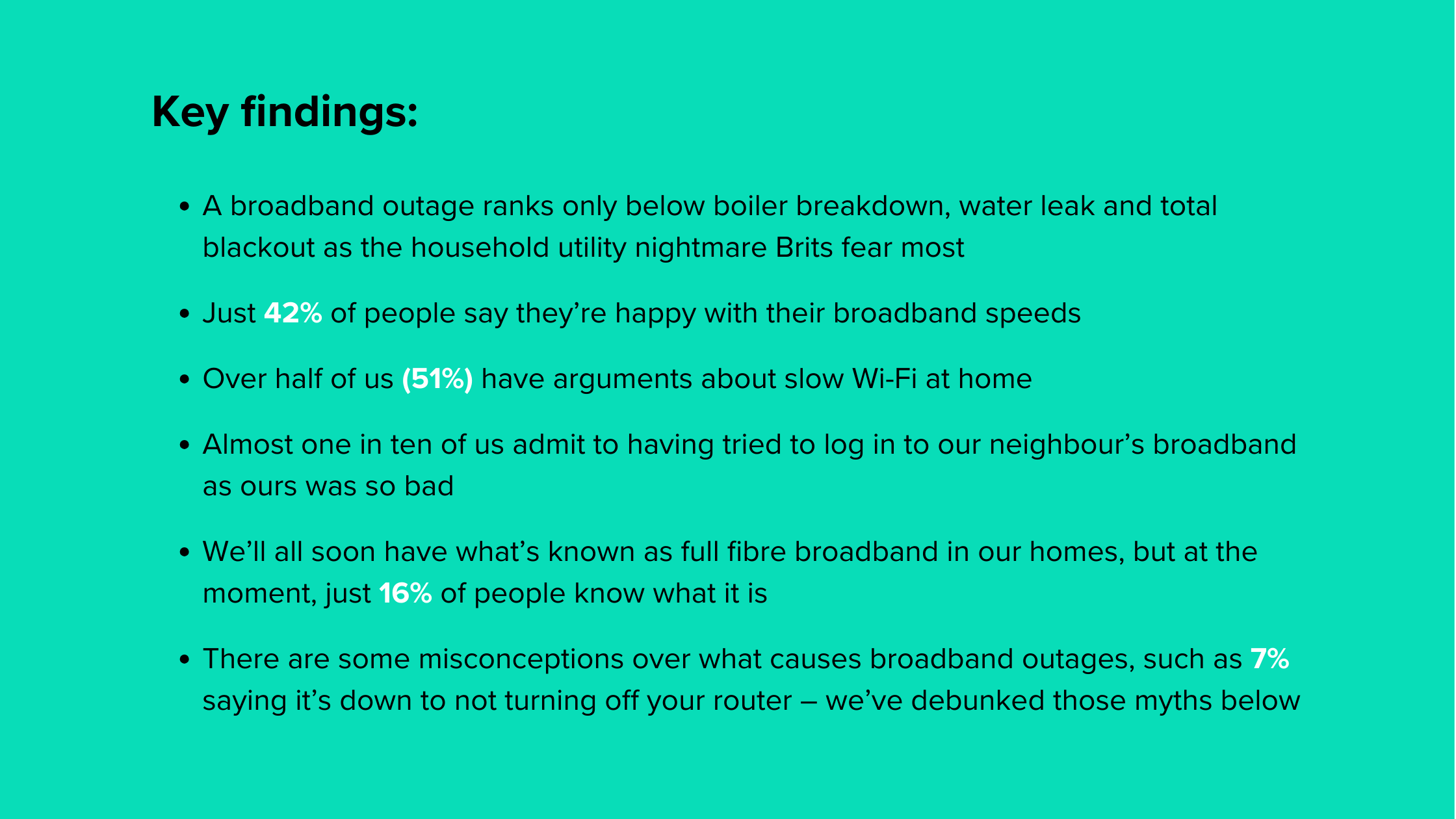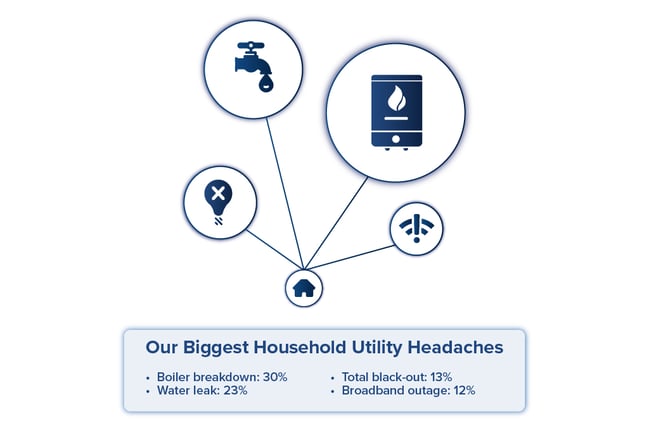Survey Findings
The Great British Broadband Survey
Commissioned by the full fibre broadband provider 4th Utility has revealed a total Wi-Fi outage is among the household problems we fear the most – as well as a long list of intriguing insights about our relationship with the internet.

Broadband is something most of us use and rely upon every day. So, from a survey of 2,000 respondents, we’ve uncovered a treasure trove of data and interesting stats about the ways we use it, how much we pay for it – and what we understand about it.
Among other discoveries, our research has uncovered how often we row about slow Wi-Fi, how many of us have tried to log in to their neighbour’s internet because theirs was so bad (you’d be surprised!), which cities pay the most for their connections and, with full fibre broadband soon to be a fixture in every UK home, how many people really know what it is.

Our biggest household utility headaches revealed – and how often we argue about slow internet
Picture the scene: you’re in the office, minutes away from finishing work and beginning your commute.
Your phone rings. It’s the other half, and they have some bad news. Consider the following common household headaches – which of these do you fear them saying most?
- Total broadband outage
- Boiler breakdown
- A water leak
- A blackout
- A broken oven
- Your garden fence being blown over
Safe to say, none are exactly ideal.

But a clear winner for respondents to our survey was a boiler breakdown, with 30% of people opting for this headache that usually requires a pretty dear solution.
Next up was an equally terrifying water leak (23%), followed by total blackout (13%). Closely following that was a total broadband outage (12%) ahead of even a broken oven and garden fence being blown over, showing how much Brits rely on good, fast connections when they’re at home.
4th Utility’s Great British Broadband Survey of residents across the country also showed us how slow - or no - broadband is a major problem for many of us, with just 42% saying they’re happy with their broadband speeds.
One in five respondents reported experiencing problems with slow internet at least three times a month. One in three said those problems happen up to twice a month.
It’s a cause of friction in many households, with 51% of respondents reporting they argue about slow Wi-Fi, with those heated discussions hitting three in ten of us a few times a month or more.

London rules the roost when it comes to broadband rows
So these arguments clearly hit many of us, but our survey also showed some distinct regional variations.
Despite it being the capital and having a reputation for receiving more digital investment than anywhere else, it would appear people in Greater London get more worked up about their broadband speeds than those anywhere else.
A total of 73% of Londoners reported arguments about broadband at least once a year, with over 20% saying they occur at least once a week.
Those problems are backed up by the how frequently Londoners told us they experience broadband problems. The figures of 34% for 1-2 a month; 22% for 3-5; and 4% for 6-10 were consistently high, and higher than most other regions – and clearly a big frustration for those living in the capital. So much so, that 12% of Londoners admit to having tried to log in to their neighbour’s Wi-Fi as theirs was so bad – higher than the UK figure of 1 in 10.

What percentage of people say they have arguments about their broadband at least once a year?
- Greater London 73%
- West Midlands 61%
- Northern Ireland 58%
- East of England 54%
- North East 54%
- North West 51%
- South East 47%
- East Midlands 46%
- Wales 44%
- Yorkshire & Humber 44%
- South West 43%
- Scotland 42%
It’s no surprise to see how frustrated UK residents can get about broadband outages when you consider many are overpaying for the services they receive.
A recent study by Uswitch found that the average UK broadband bill was £26.39 per month.
However our survey found that the cost of living crisis sweeping the UK may have put paid to that, with almost half of respondents shelling out over £30 a month for their broadband, with the bill for around one in 10 coming in at £50+.
On average, it found that Brits pay £33.52 a month – over £8 more than Uswitch’s average amount.
In terms of cities, there were some intriguing outcomes when it comes to how much we pay.
It appears those in Sheffield pay the most for their broadband, with the average monthly charge topping £36.
Belfast and London residents had the next most pricey bills, followed by Nottingham and Liverpool in 4th and 5th place.
Of the cities surveyed, bills for those living in Newcastle and Cardiff were the cheapest, coming in closer to that Uswitch average at around £29.

At 4th Utility, we know these figures for too many people are far too high, and that a fast internet connection should be a basic human right. That’s why we’re working hard to shout about our Social Tariff plan. Accredited by Ofcom and pricing in at just £13.99 a month, it’s one of the cheapest around – and something we want all our eligible customers to know about.
We’ll all soon have full fibre broadband - but right now, very few people know what it is
In addition to finding out key stats about Britain’s broadband woes, the survey also revealed how unfamiliar consumers are with terms such as full fibre, despite the fact it will soon overtake its copper counterpart in being the most common broadband type in UK households.
Full fibre, or fibre to the premises (FTTP), is the next generation of broadband, providing the fastest internet speeds available in the UK, offering the most consistent, reliable connection.
It involves running a high-capacity optical fibre cable directly to your home, allowing for smooth connections even during data-heavy activities such as 4K streaming or online gaming.

But despite our ever-increasing reliance on broadband and fast internet, and an estimated 50% of people in the UK now having access to it, not many people seem to know what it is.
Just 14% said they felt confident they knew what the acronym FTTP (fibre to the premises) stood for, while just 16% of respondents felt confident they could fully define the meaning of full fibre internet.
Even fewer (9%) knew the meaning of terms such as bandwidth, how much information that can be sent between computers over a connection; or Internet of Things (8%), technology allowing items such as computers, cameras, watches and even cars to interact.

In fact, UK broadband bewilderment stretches further. Even when told the exact meaning of full fibre, 20% of respondents still weren’t sure if they had it or not. 45% said they did have it, with the remainder saying they didn’t.
The real reason behind broadband outages – and how to prevent them
Full moon? Bad weather? Poor service provider? Not clearing your cache?
Our survey also unveiled the confusion facing many around exactly what causes those infuriating broadband outages, with over 50% of respondents experiencing issues with their broadband speeds, and 14% saying those issues are weekly.
Many of the responses were right on the money, pointing to aspects such as poor service, more people being online, being far away from the router or the device being old, which are the most common reasons for this type of outage, as well as adverse weather conditions.
Others thought it was electrical items like microwaves slowing down signal (which can sometimes be the case) or a full moon (which is never the case).
A total of 7% of respondents said not turning off your router at night was the culprit, however this is actually a misconception. Put simply, routers are designed to handle continuous operation, and turning them off at night generally has no significant impact on internet speed.
Our top tips to preventing broadband outages:
- If you’re with a full fibre provider like 4th Utility, NEVER move the router itself. That’s because they’re normally in a position where the fibre or line comes into the home, and fibre is a very delicate material.
- If you’re not with a full fibre provider, and have options on where you can safely position the router, quieter rooms where the family doesn’t regularly gather are best BUT make sure that quiet spot isn’t behind the telly, or in the kitchen next to lots of metal appliances likely to interfere with signal.
- Password protect your broadband if you haven’t already to prevent anyone you don’t know from using it.
- Be sure to keep your router switched ON overnight to ensure it doesn’t miss any important updates.
- Keep your router in the correct position – the one recommended, instructed or fitted by your broadband provider. That could be upright, on its side or even attached to the wall.



